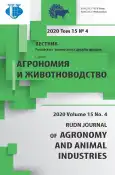Продуктивность сортов сои при различных режимах орошения
- Авторы: Толоконников В.В.1, Канцер Г.П.1, Кошкарова Т.С.2, Чамурлиев Г.О.3
-
Учреждения:
- Всероссийский научно-исследовательский институт орошаемого земледелия
- ФНЦ Всероссийский научно-исследовательский институт масличных культур им. В.С. Пустовойта
- Российский университет дружбы народов
- Выпуск: Том 15, № 4 (2020)
- Страницы: 343-352
- Раздел: Растениеводство
- URL: https://journal-vniispk.ru/2312-797X/article/view/316908
- DOI: https://doi.org/10.22363/2312-797X-2020-15-4-343-352
- ID: 316908
Цитировать
Полный текст
Аннотация
Площади посева сои в мире ежегодно увеличиваются на 3 млн га и обеспечивают получение средней урожайности 2,7 т/га. Значительный рост отечественного соепроизводства сдерживается усилением аридизации климата, снижающейся урожайностью по стране до 1,5 т/га. Важным фактором интенсификации производства сои является расширение ее посевов в условиях орошения, где внедрение адаптированных и высокопродуктивных сортов региональной селекции, сопровождаемое улучшением водопотребления растений, способствует увеличению уровня урожайности до 3…4 т/га зерна. Объектом исследований являются разноспелые сорта сои селекции Всероссийского научно-исследовательского института орошаемого земледелия (ФГБНУ ВНИИОЗ), допущенные в сельскохозяйственное производство Нижнего Поволжья: ВНИИОЗ 86 (с 2002 г.), ВНИИОЗ 31 (с 2011 г.), Волгоградка 2 (с 2020 г.). Исследования проводили в ФГУП «Орошаемое» ФГБНУ ВНИИОЗ в 2013-2015 гг. Опыт включал два фактора: фактор А - сорта, фактор В - режим орошения с вариантами 70-80-70 % НВ (70 % в период «посев - конец бутонизации» и в период созревания 80 % НВ - цветение - налив бобов), 80-80-70 % НВ и 80-80-80 % НВ - контроль. Делянки 1-го (600 м2) и 2-го (200 м2) порядка были посеяны в 4-кратной повторности в середине мая широкорядным способом (0,7 м) с планируемой урожайностью сортов 2,5…3,5 т/га (N90P90K60 д. в./га). Сорта сои отличались особенностями формирования структуры урожая. Применение дифференцированного по фазам развития растений режима орошения сопровождались более экономным водопотреблением растений по сравнению с постоянным режимом, что способствовало росту урожайности. Самые высокие уровни урожайности за годы исследований были сформированы посевами сорта Волгоградка 2 (2,87…3,23) и ВНИИОЗ 31 (2,82…3,19), что существенно выше, чем у раннего сорта ВНИИОЗ 86 (2,17…2,51 т/га). Переменный режим орошения приводил к росту урожайности у всех сортов сои, особенно у Волгоградки 2 - на 0,31…0,36 т/га, или на 10,8…12,5 %, к контролю, благодаря повышению доли зерна в общей биомассе до 30,9…36,2 % в сравнении с контролем - 26,6…27,5 %. Наиболее значительный объем послеуборочных растительных остатков (стеблей, листьев и корней) остается в поле после уборки сортов Волгоградка 2 (6,39…7,63 т/га) и ВНИИОЗ 31, хорошо улучшающих почвенное плодородие (6,73…7,9 т/га), и наименьший объем - после раннего сорта ВНИИОЗ 86 (4,41…5,66 т/га). Дифференциация режима орошения приводила к уменьшению поступления вегетатив- ной массы в почву - 4,41…7,42 т/га по сравнению с контролем 5,66…7,9 т/га. Таким образом, лучшими сортами для орошаемого земледелия Нижнего Поволжья являются скороспелый новый сорт Волгоградка 2 и среднескороспелый ВНИИОЗ 31, обеспечивающие при дифференцированном (сравнительно экономном) режиме орошения получение высокой урожайности и улучшающие почвенное плодородие за счет поступления высоких объемов биомассы в почву после уборки.
Ключевые слова
Об авторах
Владимир Васильевич Толоконников
Всероссийский научно-исследовательский институт орошаемого земледелия
Автор, ответственный за переписку.
Email: tolokonnikov@vniioz.ru
доктор сельскохозяйственных наук, ведущий научный сотрудник отдела интенсивных технологий возделывания сельскохозяйственных культур
Российская Федерация, 400002, г. Волгоград, ул. Тимирязева, д. 9Галина Павловна Канцер
Всероссийский научно-исследовательский институт орошаемого земледелия
Email: vniioz@yandex.ru
научный сотрудник отдела интенсивных технологий возделывания сельскохозяйственных культур
Российская Федерация, 400002, г. Волгоград, ул. Тимирязева, д. 9Татьяна Сергеевна Кошкарова
ФНЦ Всероссийский научно-исследовательский институт масличных культур им. В.С. Пустовойта
Email: koshkarova_ts@vniioz.ru
кандидат сельскохозяйственных наук, старший научный сотрудник отдела сои
Российская Федерация, 350038, г. Краснодар, ул. им. Филатова, д. 17Георгий Омарович Чамурлиев
Российский университет дружбы народов
Email: giorgostsamourlidis@mail.ru
кандидат сельскохозяйственных наук, старший преподаватель
Российская Федерация, 117198, г. Москва, ул. Миклухо-Маклая, д. 6Список литературы
- Gossortommission. State register of selection achievements approved for use in 2018. Available from: http://reestr.gossort.com [Accessed: 3rd December 2019].
- Slobodyanik NS. Breeding new varieties of soybean in the production process of original seeds. International Research Journal. 2015; 1 (32) P. 1: 104—105. (In Russ).
- Kruzhilin IP. Optimizatsiya vodnogo rezhima pochvy dlya polucheniya zaplanirovan-nykh urozhaev sel’skokhozyaistvennykh kul’tur v stepnoi zone i polupustynnoi zonakh Nizhnego Povolzh’ya [Optimization of the water regime of the soil for obtaining planned crop yields in the steppe zone and semi-desert zones of the Lower Volga region] [Dissertation] Volgograd; 1982. (In Russ).
- Tedeeva AA, Khokhoeva NT, Tedeeva VV. Advanced elements of technology for leguminous crops cultivation. Advances in current natural sciences. 2018. (7):59—64. (In Russ).
- Vital RG, Muller S, Da Silva FB, Batista PF, Merchant A, Fuentes D, et al. Nitric oxide increases the physiological and biochemical stability of soybean plants at high temperature. Agronomy. 2019; 9(8):412. doi: 10.3390/agronomy9080412
- Koshkarova TS, Tolokonnikov VV, Kantser GP, Mukhametkhanova SS. Modernization of seed production methods for soybean varieties in the Lower Volga region. Proceedings of Nizhnevolzskiy agrouniversity complex: science and higher vocational education. 2020; (3):205—211. (In Russ). doi: 10.32786/2071–9485–2020–03–21.
- Miladinović J, Ćeran M, Đorđević V, Balešević-Tubić S, Petrović K, Đukić V, et al. Allelic variation and distribution of the major maturity genes in different soybean collections. Frontiers of Plant Science. 2018; 9:1286. doi: 10.3389/fpls.2018.01286
- Food and Agriculture Organization of the United Nations. Statistics Vision, 2016. Available from: http://faostat3.Fao.org/download9/gs/e [Accessed: 3rd December 2019].
- Tolokonnikov VV, Kancer GP, Koshkarova TS, Kozhukhov IV. Adaptive, high-white soybean grades for cultivation in meliorized agrolandscapes in south and central Russia. Proceedings of Nizhnevolzskiy agrouniversity complex: science and higher vocational education. 2018; (4):166—170. (In Russ). doi: 10.32786/2071–9485– 2018–04–23
- Chamurliev OG, Tolokonnikov VV. Influence of varietal characteristics and techniques of AG-rostehnika on soybean yields under irrigation. Proceedings of Nizhnevolzskiy agrouniversity complex: science and higher vocational education. 2015; (3):87—91. (In Russ).
- Robison JD, Yamasaki Y, Randall SK. The ethylene signaling pathway negatively impacts CBF/DREB-regulated cold response in soybean (Glycine max). Frontiers in Plant Science. 2019; 10:121. doi: 10.3389/ fpls.2019.00121
Дополнительные файлы










